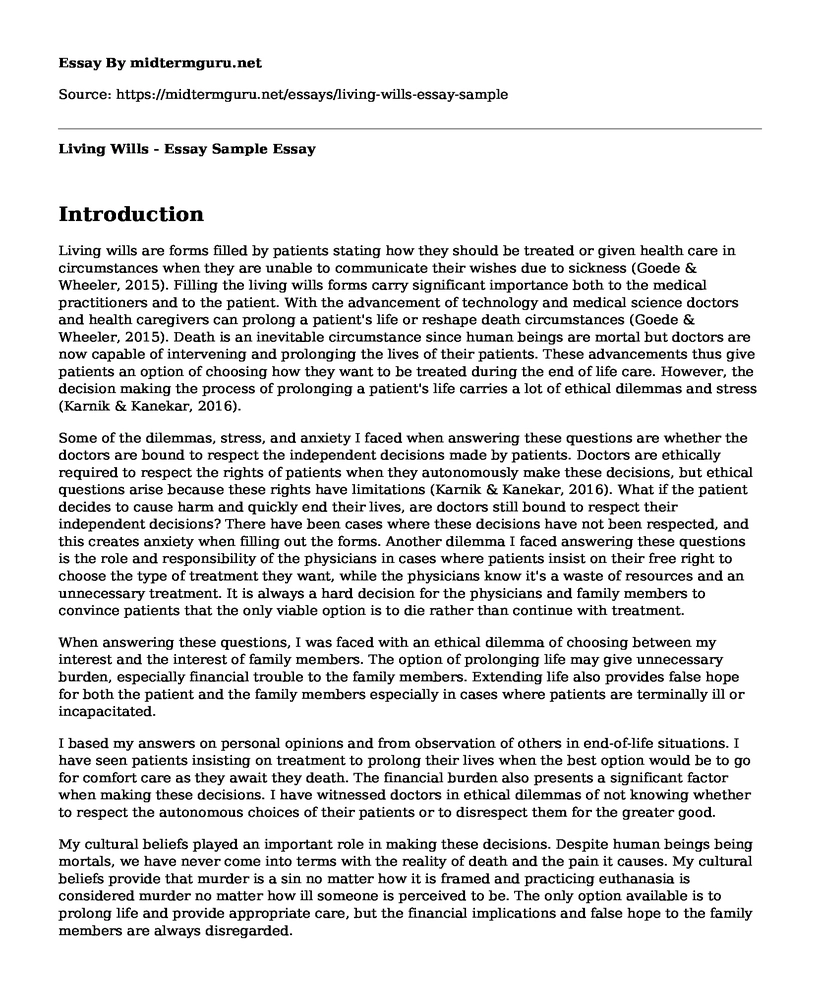Introduction
Living wills are forms filled by patients stating how they should be treated or given health care in circumstances when they are unable to communicate their wishes due to sickness (Goede & Wheeler, 2015). Filling the living wills forms carry significant importance both to the medical practitioners and to the patient. With the advancement of technology and medical science doctors and health caregivers can prolong a patient's life or reshape death circumstances (Goede & Wheeler, 2015). Death is an inevitable circumstance since human beings are mortal but doctors are now capable of intervening and prolonging the lives of their patients. These advancements thus give patients an option of choosing how they want to be treated during the end of life care. However, the decision making the process of prolonging a patient's life carries a lot of ethical dilemmas and stress (Karnik & Kanekar, 2016).
Some of the dilemmas, stress, and anxiety I faced when answering these questions are whether the doctors are bound to respect the independent decisions made by patients. Doctors are ethically required to respect the rights of patients when they autonomously make these decisions, but ethical questions arise because these rights have limitations (Karnik & Kanekar, 2016). What if the patient decides to cause harm and quickly end their lives, are doctors still bound to respect their independent decisions? There have been cases where these decisions have not been respected, and this creates anxiety when filling out the forms. Another dilemma I faced answering these questions is the role and responsibility of the physicians in cases where patients insist on their free right to choose the type of treatment they want, while the physicians know it's a waste of resources and an unnecessary treatment. It is always a hard decision for the physicians and family members to convince patients that the only viable option is to die rather than continue with treatment.
When answering these questions, I was faced with an ethical dilemma of choosing between my interest and the interest of family members. The option of prolonging life may give unnecessary burden, especially financial trouble to the family members. Extending life also provides false hope for both the patient and the family members especially in cases where patients are terminally ill or incapacitated.
I based my answers on personal opinions and from observation of others in end-of-life situations. I have seen patients insisting on treatment to prolong their lives when the best option would be to go for comfort care as they await they death. The financial burden also presents a significant factor when making these decisions. I have witnessed doctors in ethical dilemmas of not knowing whether to respect the autonomous choices of their patients or to disrespect them for the greater good.
My cultural beliefs played an important role in making these decisions. Despite human beings being mortals, we have never come into terms with the reality of death and the pain it causes. My cultural beliefs provide that murder is a sin no matter how it is framed and practicing euthanasia is considered murder no matter how ill someone is perceived to be. The only option available is to prolong life and provide appropriate care, but the financial implications and false hope to the family members are always disregarded.
Conclusion
In conclusion, I believe medical science and technology has played an excellent role in innovating and implementing new tactics to prolong life and offer quality and comfort care mainly to the sick and the dying. However, I recommend that these options only apply to circumstances where there is hope of life regardless of the independent decisions by the patients. Patients should consider the interests of the family members and avoid overburdening their families and giving false hope; they should instead accept the norms of natural death.
References
Goede, M., & Wheeler, M. (2015). Advance directives, living wills, and futility in perioperative care. Surgical Clinics, 95(2), 443-451.
Karnik, S., & Kanekar, A. (2016, June). Ethical issues surrounding end-of-life care: a narrative review. In Healthcare(Vol. 4, No. 2, p. 24). Multidisciplinary Digital Publishing Institute.
Cite this page
Living Wills - Essay Sample. (2022, Dec 21). Retrieved from https://midtermguru.com/essays/living-wills-essay-sample
If you are the original author of this essay and no longer wish to have it published on the midtermguru.com website, please click below to request its removal:
- Essay on Pros and Cons of Abortion
- Ways That Parenting Has Changed in the United States - Paper Example
- Essay on Lifestyle Diseases
- Benchmarking Healthcare Policy Analysis: Affordable Care Act
- Paper Example on Nursing: Servant Leadership Model
- Hydrogen Trains and Energy Sustainability - Research Paper
- CTE: Brain Injuries, Thinking & Memory Problems, and Behavioral Changes - Research Paper







